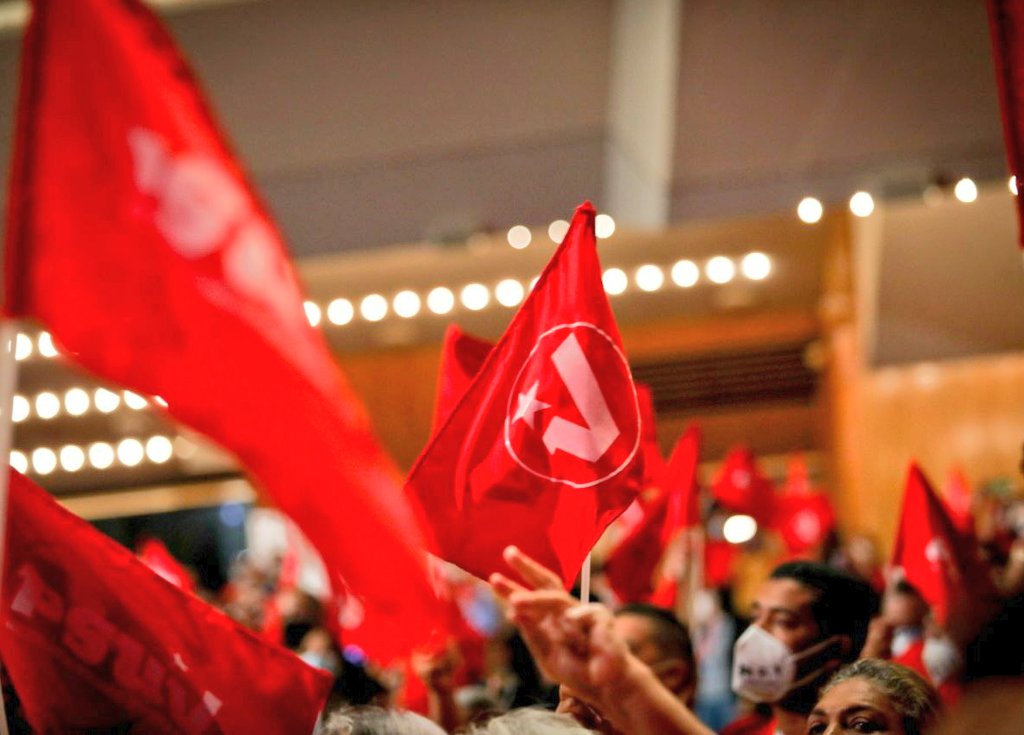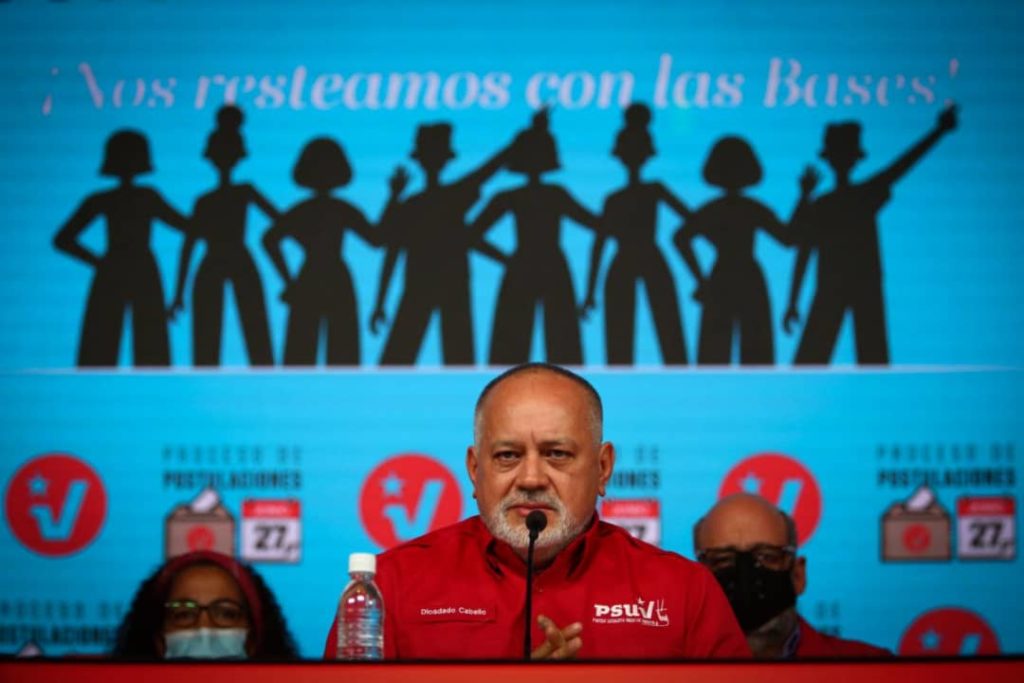
PSUV flags being hold by party members during a congress. File photo.

Orinoco Tribune – News and opinion pieces about Venezuela and beyond
From Venezuela and made by Venezuelan Chavistas

PSUV flags being hold by party members during a congress. File photo.
After four days of tabulating the results and analyzing the internal application process held last Sunday, June 27, the National Electoral Commission of the United Socialist Party of Venezuela (PSUV) reported that a total of 57,003 women and 43,972 men were nominated for a total of 100,975 applicants for leadership positions.
“It is an impressive number,” said the first vice president of the party, Diosdado Cabello. “That is the first highly positive report—that a party, from its bases, nominates more than one hundred thousand people for leadership in popularly elected positions.”
Cabello also specified that there were more votes for those positions that are closer to the communities. For example, for city council positions over two million people voted.
Important decisions
He then announced that the initial number was filtered to make the second stage feasible. This means that a maximum of 10 women and 10 men who receive the most votes for single-member positions will go to the open primaries on August 8. “An election with 100,000 candidates is unmanageable,” noted Cabello. “It is impossible from a logistical and electoral point of view.”
He reported that among women, Margaud Godoy, current governor of the Cojedes state, was the most popular choice with 54.21% of the votes. Among men, Adolfo Pereira, current governor of Lara state, was the most favored with 52.48%. “Now they have to win their primary elections by direct and secret ballot,” said Cabello.
Another important element is that the selection of public officials nominated to participate in the second phase of primaries as pre-candidates is subject to the decision of the high political command of the Revolution. “With that, there has been an extraordinary receptivity,” said the deputy to the National Assembly (AN).
RELATED CONTENT: Report on First Phase of PSUV Primaries Process—21N Regional Elections
In this regard, he explained that governors who aspire to repeat must have a minimum of 35% of support in the June 27 voting process. In the case of incumbent mayors who wish to run for re-election, they must have obtained at least 30%: “We have asked several people [who did not obtain the minimum required] to withdraw from the process and they have accepted to do so with great political maturity… We are not kicking them out of politics, but there is an express reality represented in the voting process. On November 21 we are aiming at the most possible victories.”
“The people manifested themselves and that is the most beautiful thing about it,” said Cabello in his concluding remarks. “In addition to the example that our cadres set when they were called and told to ‘concede to those who received the most votes’ because the Revolution needs them elsewhere. We haven’t had a problem with that so far.”
High odds of winning the 21N
The parliamentarian optimistically assured that “those who win these primary elections have a very high probability of being elected on November 21. They will advance as standard bearers of the largest party in America.” He recalled that the primaries will be open. In other words, anyone registered in the Permanent Electoral Registry may participate, regardless of whether he or she is a member of another political organization or is not a member of any.
Finally, regarding the irregularities and breaches of the internal regulations presented by the two-stage primaries, Cabello noted that “they are not the fault of the rank and file, but of those who have been competing to be elected due to their position, believing themselves to be leaders.”
“Our Party is getting stronger and unity is growing,” he added. “The conscience of our people is strengthened and we are obliged to be consistent with those people.”

Results
In Amazonas, the women who will go to the primaries are: Kissi Amaro, Delkis Batidas, Lisneida Bossio, Eugenia Camico, Lienny González, Liliany Guevara, Analí Herrera, Yamilet Mirabal, Kenelma Peñalver and Noris Requena. For the men, Jefferson Camejo, José Hernández, Oswaldo Hurtado, José Mavio, Elvis Mirabal, Miguel Rodríguez, Wilmer Rodríguez, Ángel Sandoval, César Sanguinetti and Argimiro Silva.
In Anzoátegui, the women include Haidee Barrios, Urquía Barrios, Yohangelis Coa, Herminia García, María Leonet, Zaida París, Dinorah Requena, Eneyda Ron, Natacha Rondón, María Torres. The men advancing to the primaries are Letsi Aponte, Gudelio Gámes, Daniel Haro, Gustavo Jiménez, Eliseo López, Luis Marcano, Juan Narváez, Amabilis Obediente, Ángel Páez, and Juan Rodríguez.
In Aragua, for women: Karina Carpio, Ana Lacava, Rosa León, Grehyndee Oliveros, Mariana Padrón, Marioski Piñango, Mary Romero, Egle Sánchez, Miriam Sosa, Ana Valbuena. And for the men, Fernando Álvarez, Roy Daza, Arcadio Flores, Jesús Franco, Mauricio Hinojosa, Jean Marchena, Rodolfo Marco, Ricardo Molina, Gerson Quiroz, and Víctor Ruido.
In Apure, the shortlisted women are: Ana Avendaño, Enma Díaz, Omaira Eslava, Neila Fuentes, Miriam Gómez, Nora Malvacia, Ambar Montilla, Macli Pineda, Nancy Polanco and Sandra Sánchez, while the men include Vladimir Balcazar, Ramón Carrizález, Anner Corona, Jesús Cortez, Junior Gutiérres, Pedor Leal, Hugo Morales, Juan Pérez, Miguel Piñuela, and José Rodríguez.
Other governorates
In Barinas, for women: Naybeth Berríos, María Díaz, Keissy Gómez, Vanessa Guarín, Rosini Jáuregui, Zulay Martínez, Ysmelda Montilla, Belkis Quintero, Josefa Santana. Men: Argenis Aldazoro, Argenis Chávez, Hugo Chávez, Marcos Dugarte, Salvador Guerrero, Luis Hernández, Nerlandy Márquez, Yoris Montilla.
In Miranda, the women who will contend the primaries are: Rosa Becerra, Liliana González, Aleida Guzmán, Ariana Hernández, Azucena Jaspe, Aurora Morales, Sony Sánchez, Ornela Serrano and Zulema Trechi. For men: Héctor Rodríguez, Claudio Farías, Daniel Jiménez, Rodolfo Sanz, Elio Serrano, Lenin Rosa, Genkerver Tovar, Daniel Brito, and Gilbert Pérez.
Mayor of Caracas
In Caracas, the candidates will include Zulay Aguirre, Yuset Brito, Carmen Centeno, Jacqueline Faría, Carmen Mélendez, Mary Moreno, Griselda Oliveros, Tamara Prieto, Caryslia Rodríguez and Lesbia Sánchez among women. Among the men, Alexander Aranguren, Juan Contreras, Atanasio González, William Gudiño, Leonel Guzmán, Tamanaco Lara, Carlos Mogollón, Francisco Quevedo and Alexander Vargas will advance to the primaries.
This slideshow requires JavaScript.
No votes – no go
Diosdado Cabello also reiterated that the governors aspiring to re-election who participated in the nominations and did not obtain a minimum of 35% of support on June 27 will not be able to proceed to the next phase of primaries. Thus, in the governments of Portuguesa, Sucre and Trujillo, the governors Rafael Calles, Edwin Rojas and Henry Rangel Silva, respectively, cannot advance to the second phase. Nor can José Manuel Suárez in La Guaira, who succeeded Jorge Luis García Carneiro after his sudden death, on May 22, as well as Erika Farias, the current mayor of Caracas’ Libertador municipality.
Featured image: PSUV flags being waved by party members during a congress. File photo.
(RedRadioVE and RedRadioVE) by Lucía Eugenia Córdova
Translation: Orinoco Tribune
OT/JRE/SL

You must be logged in to post a comment.